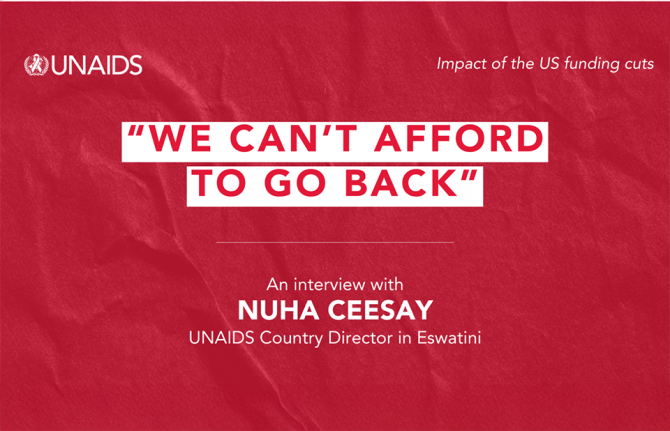
Feature Story
High-level delegation commits to tackle the deadly epidemics of TB and HIV in Southern Africa
22 March 2013
22 March 2013 22 March 2013
L to R: UNAIDS Executive Director, Michel Sidibé and Dr Barnabas Sibusiso Dlamini, Prime Minister of Swaziland.
Credit: UNAIDS/J.Matas
Despite being one of the smallest countries in Africa, Swaziland has the highest percentage of people living with HIV anywhere in the world. More than a quarter of its adult population are living with the virus. Yet the people of Swaziland are facing not just one, but two deadly epidemics which intertwined are wreaking havoc throughout not only Swaziland but the whole of the sub-Saharan African region. Those epidemics are tuberculosis (TB) and HIV.
More than three-quarters of people who have TB in Swaziland are also living with HIV and an estimated 16 000 Swazis develop life-threatening, active TB disease every year. The combination of the two epidemics has made TB the leading cause of death in people living with HIV as the TB bacteria accelerates the progression of HIV infection to AIDS, weakening the body’s immune system until it can no longer fight disease.
But Swaziland is also determined to stop the epidemics in their tracks.
This week Swaziland played host to a powerful delegation of health leaders and experts committed to ending the dual epidemics of TB and HIV across the region. Convened by the Ministers of Health of both Swaziland and South Africa, supported by the Stop TB Partnership the meeting brought together brilliant minds and solid expertise to find ways of accelerating action to end the TB and TB/HIV co-epidemics in the countries of the Southern Africa Development Community (SADC).
“This is our last chance to put Africa back on track to achieve TB and HIV related targets,” said Dr Sibusiso Dlamini, Prime Minister of Swaziland stressing that progress towards the goal of reducing TB deaths in people living with HIV by 50% by 2015, set in the 2011 United Nations General Assembly Political Declaration on HIV and AIDS, was not moving fast enough.
Recognizing the importance of the challenge, Aaron Motsoaledi, Minister of Health of South Africa spurred participants to action, “You don’t set out to climb Everest expecting to fail,” he said. “We must set out expecting to succeed, no matter the size of the challenge ahead. Olympic athletes often come from far behind to win the race, we can do the same.”
The Everest he was referring to was the strong declaration of commitment which came out of the meeting––the ‘Swaziland Statement’. The statement highlights the determination of each of the partners to significantly cut TB/HIV related deaths over the next 1000 days and reach the 2015 goals.
“We need to lift up our expectations and raise our financial and technical contributions to realise the commitments we made to reduce the impacts of TB,” said Dr Lucica Dittu, Executive Secretary of the Stop TB Partnership.
Important commitments outlined in the statement include the full integration of TB and HIV services, new partnerships with non-traditional partners, a reinforcement of programmes and services and new and innovative methods of financing the response to the two diseases.
“A thousand people living with HIV die every day of TB on the African continent, this is unacceptable,” said UNAIDS Executive Director Michel Sidibé. “This initiative brings momentum, commitment and renewed energy which will produce results and improve the lives of millions of people across the region.”
UNAIDS pledged to continue working closely with its partners including the Stop TB Partnership and the Global Fund to Fight AIDS, Tuberculosis and Malaria to ensure that everyone living with both HIV and active TB is able to start HIV treatment; that everyone in TB care is offered an HIV test; and that everyone in HIV care is offered screening for TB.



